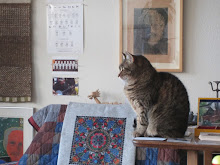Wednesday, February 14, 2018
Sharing Unguarded And Guarded Moments And Dreams On Valentine's Day
A few nights before Valentine's Day, one of my former medical transcription co-workers organized what has become a yearly get-together at a local Asian restaurant. Twelve of us showed up. None of us work as medical transcriptionists anymore. I was the holdout until last October, when I gave up working as a medical transcription editing subcontractor for less than minimum wage and no benefits in a field that once gave us all a good income with excellent benefits. The oldest of us is 70. The youngest seemed to be in her late 20s or early 30s. She brought her 5-month-old daughter who seemed to thoroughly enjoy the social occasion. We certainly enjoyed her unguarded presence. The youngest former transcriptionist started working at the hospital sometime after I left in December 2003.
Until I received a group email with attached photos, I didn't realize that another somewhat younger former co-worker had taken out her cell phone and had taken pictures of all of us that she could see from her place at the far end of our long patched-together table, including a selfie with the woman sitting next to her. That was the only photo that was at all flattering to the subjects. She caught us all in unguarded moments, none expressing how much we enjoyed being together. It puzzles me that she would send photos that, for the most part, show us looking unhappy or tense. Although I was enjoying myself and feeling good about myself, in that unguarded moment I look distant, remote, unengaged, possibly like a sad drunk, although I was drinking water. I see myself with very critical and judgmental eyes, I know. Near the end of the dinner, she called my name. When I looked up, she had her cell phone aimed at me. I quickly put on my best guarded photo face.
In the photo from my childhood with my middle sister and my older step-cousin, I have a rare unguarded smile. As an adult, I have never been able to smile so freely in photos. I wish I could. I freeze when cameras are pointed at me. I remember being told as a small child by my mother that my shy little smile was not good enough. I would contort my face to have the "good enough" smile she desired. As I grew older, my smile in photos became guarded, frozen, tight, expressing that I felt hopelessly ugly, awkward, inadequate.
This year as Valentine's Day (after what would have been my father's 104th birthday on February 11) approached, I felt at odds with myself, uneasy, unsettled, edgy, feeling that I needed more sleep than usual and drifting into the old low self-esteem, even self-hate, that I lived with from early childhood until I was 37 years old and began to recover from bulimia, anorexia, and alcoholism. Although I haven't seen my mental health counselor for two months, something prompted me last week to make an appointment. My mental health diagnosis is related to past trauma. I have come a long way. My current counselor is the best one I've ever had. Her first opening was on Valentine's Day at 10:30 a.m.
These last two weeks have been particularly difficult. Nothing difficult happened that hasn't happened many times before, but my emotional reactions seemed way out of proportion to the circumstances. Those emotions that I guard so carefully were exposed, and I could not escape the reality that I felt hurt, jealous, sad, ashamed, and angry --very angry.
When I was a little girl, my father told me that I looked ugly when I was angry. My mother was angry on a regular basis, but I didn't observe him telling her that she looked ugly. Perhaps taking the cue from my mother, I was angry much of the time, although I tried to hide my anger. I concluded that I was truly ugly when I was angry. As much as I tried, I could not hide my anger. I could not hide what my father called ugly. I told myself at 6 years old, "Boys don't like me because I am ugly. No one will ever marry me." When we were 7 years old, a Roman Catholic friend of mine had a nun doll. I wasn't sure what a nun doll was, but the doll seemed to bring happiness to my friend. My friend didn't look angry. I wished I were as pretty as she was. She looked kind. I asked for a nun doll for my birthday. My mother bought me a blonde bride doll instead. The bride doll looked miserable. The doll was only a child, a child bride. My father used to joke that my mother was his child bride. She would get angry and say, "That's not funny." My father seemed to enjoy making my mother angry. I started thinking that my mother was ugly, too. She looked like me.
Of course, no one was ugly. It was all a lie that I believed because there was no one to tell me otherwise, and then a few years later my youngest sister told me that an older boy had told her that she was the only pretty girl in our family. That cemented the lie for me. A boy said I was not pretty. My father said I was ugly. I was convinced. When I was 10 years old, I went on my first diet, sensing that my parents were not pleased with my body that was developing earlier than most girls. Now I felt that I was both ugly and what I thought was fat. I was always on one diet or another until I was 37 years old.
At 10 years old, I was prescribed glasses for nearsightedness. Already feeling ugly and fat, I refused to wear my glasses. As a result, I could not see people's faces unless they were in close proximity. Other children thought I was what we used to call "stuck up." I assumed that boys thought that I was ugly, even without glasses. They kept their distance from me. I did not put them at ease. I was painfully shy and awkward and never had a boyfriend until I was 17 years old and met a charming 17-year-old high school dropout who smoked cigarettes and marijuana, took LSD and other hallucinogens, uppers and downers, and used intravenous drugs, all because he didn't want to become an alcoholic.
He told me I looked pretty when I was angry. He said, "How could somebody NOT love you?" He won my heart. I idolized him. I won his heart. We broke each other's hearts. I thought the problem was that I was fat and ugly. Nothing he said could convince me otherwise. I could not believe that I was worthy of love. He couldn't believe he was worthy of love. He proceeded on a path of self-destruction that ended with his death at age 58.
The only time he sent me a Valentine was when we were about 40 years old. He wrote on the inside of the card, "I love you. Always will."
I remember listening to this song on one of the first Valentine's Days after I met him:
Last Valentine's Day I dreamed a dream about him that brought me joy. My dreams seem to be a series of unguarded moments, both mysterious and enlightening, even those that are nightmares. They can bring me joy, and or they can bring me absence of joy along with insight.
May our dreams bring joy and if not joy, then insight.
I'm not sure why painful memories from the past came up this Valentine's Day, but I do know that I can't let go of what I don't acknowledge. When I tell the stories from my past, I feel myself being healed in the present. When I find myself reverting to childhood self-hate, I seek help. I am not alone anymore.
"There are some of us who in after years say to Fate, 'Now deal us your hardest blow, give us what you will; but let us never again suffer as we suffered when we were children.' The barb in the arrow of childhood's suffering is this: its intense loneliness, its intense ignorance." (Olive Schreiner, from The Story of an African Farm)
The sky just cleared, and there is snow in the hills where I saw the light a few days ago.
May we all be loved and love ourselves in our guarded and unguarded moments.
Subscribe to:
Post Comments (Atom)










2 comments:
First of all, thank you for such an honest post. And thanks for showing yourself!
I am sure I am not the only reader of your blog who relates to your memories of self hate and self doubt and denial and the very long seemingly endless string of effects this had and continues to have on our life - and whoever told us old age would do away with that?
I believe that our unresolved conflicts and hurts from childhood are a never ending burden. But that our response to this is what keeps us sane in the end because most of these hurts will never be forgiven and none of the conflicts resolved. So what is left? Acceptance and the knowledge that it will not bring us down, that there is more to our life than this - regardless.
I cannot go to my mother and demand an apology, I couldn't do it when she was alive. I don't know to this day how to forgive her but I can put all this anger and hurt in its place as part of me, knowing that it will stay there, and move on. Again and again and again.
Be good to yourself.
Sabine -- Thank you for everything you wrote. Yes. Our responses, our acceptance and the knowledge that the past does not have to determine the present or the future. We can treat ourselves better than we were treated by those who didn't treat themselves well. Intergenerational trauma can end with us.
Post a Comment